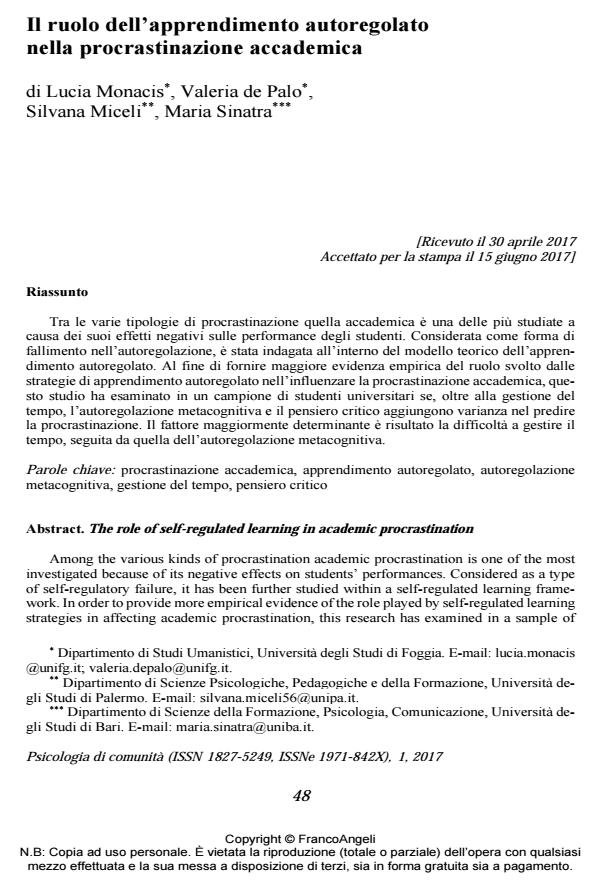The role of self-regulated learning in academic procrastination
Journal title PSICOLOGIA DI COMUNITA’
Author/s Lucia Monacis, Valeria de Palo, Silvana Miceli, Maria Sinatra
Publishing Year 2017 Issue 2017/1 Language Italian
Pages 9 P. 48-56 File size 191 KB
DOI 10.3280/PSC2017-001005
DOI is like a bar code for intellectual property: to have more infomation
click here
Below, you can see the article first page
If you want to buy this article in PDF format, you can do it, following the instructions to buy download credits

FrancoAngeli is member of Publishers International Linking Association, Inc (PILA), a not-for-profit association which run the CrossRef service enabling links to and from online scholarly content.
Among the various kinds of procrastination academic procrastination is one of the most investigated because of its negative effects on students’ performances. Considered as a type of self-regulatory failure, it has been further studied within a self-regulated learning framework. In order to provide more empirical evidence of the role played by self-regulated learning strategies in affecting academic procrastination, this research has examined in a sample of university students whether meta-cognitive control strategies and critical thinking explain variance in academic procrastination, beyond time management. The most predictive factor has resulted to be the difficulty in time management, followed by the difficulty in metacognitive self-regulation.
Keywords: Academic procrastination, self-regulated learning, metacognitive self-regulation, time management, critical thinking
- Entwistle N.J., Ramsden P. (1983). Understanding student learning. New York: Nichols.
- Corkin D.M., Shirley L.Y., Lindt S.F. (2011). Comparing active delay and procrastination from a self-regulated learning perspective. Learning and Individual Differences, 21(5): 602-606.
- de Palo V., Limone P., Monacis L. (2016). Why university students procrastinate their academic tasks. Turkish Online Journal of Educational Technology, December Special Issue: 1366-1371.
- de Palo V., Monacis L., Miceli S., Sinatra M., Di Nuovo S. (2017). Decisional procrastination in academic settings: The role of metacognitions and learning strategies. Frontiers in Psychology, 8: 973.
- Díaz-Morales J.F., Ferrari J.R. (2015). More time to procrastinators: The role of time perspective. In Time Perspective Theory; Review, Research and Application: Essays in Honor of Philip G. Zimbardo. Springer International Publishing, pp. 305-321. DOI: 10.1007/978-3-319-07368-2_2
- Ferrari J.R. (1994). Dysfunctional procrastination and its relationship with self-esteem, interpersonal dependency, and self-defeating behaviors. Personality and Individual Differences, 17: 673-679.
- Ferrari J.R. (2001). Procrastination as self-regulation failure of performance: Effects of cognitive load, self-awareness, and time limits on “working best under pressure”. European Journal of Personality, 15: 391-406.
- Ferrari J.R., Dovidio J.F. (2000). Examining behavioral processes in indecision: Decisional procrastination and decision-making style. Journal of Research in Personality, 34: 127-137.
- Ferrari J.R., Pychyl T.A. (2000). Procrastination: Current issues and new directions. Corte Madera, CA: Select Press.
- Howell A.J., Watson D.C. (2007). Procrastination: Associations with achievement goal orientation and learning strategies. Personality and Individual Differences, 43(1): 167-178.
- James W. (1886). William James Papers, 1803-1941 (1862-1910 (bulk) – MS Am 1092.9-1092.12). Harvard: Houghton Library, Harvard University.
- Mannetti L., Leder S., Insalata L., Pierro A., Higgins E.T., Kruglanski, A. (2009). Priming the ant or the grasshopper in people’s mind: How regulatory mode affects inter-temporal choices. European Journal of Social Psychology, 39: 1120-1125.
- McCown W., Johnson J., Petzel T. (1989). Procrastination, a principal components analysis. Personality and Individual Differences, 10: 197-202.
- Milgram N., Tenne R. (2000). Personality correlates of decisional and task avoidant procrastination. European Journal of Personality, 14: 141-156.
- Phillips J.G., Jory M., Mogford M. (2007). Decisional Style and eParticipation. Proceedings of the 19th Australasian conference on Computer-Human Interaction: Entertaining User Interfaces, Adelaide, Australia, November 28-30, pp. 139-141.
- Pierro A., Giacomantonio M., Pica G., Kruglanski A.W., Higgins E.T. (2011). On the psychology of time in action: regulatory mode orientations and procrastination. Journal of personality and social psychology, 101(6): 1317-1331.
- Pintrich P.R. (2000). The role of goal orientation in self-regulated learning. In Boekaerts M., Pintrich P.R. and Zeidner M., editors, Handbook of self-regulation. San Diego, CA: Academic, pp. 451-502.
- Pintrich P.R., Smith D.A., Garcia T., McKeachie W.J. (1993). Reliability and predictive validity of the Motivated Strategies for Learning Questionnaire (MSLQ). Educational and psychological measurement, 53(3): 801-813.
- Pychyl T.A., Morin R.W., Salmon B.R. (2000). Procrastination and the planning fallacy: An examination of the study habits of university students. Journal of Social Behavior and Personality, 15: 135-150.
- Rabin L.A., Fogel J., Nutter-Upham K.E. (2011). Academic procrastination in college students: The role of self-reported executive function. Journal of clinical and experimental neuropsychology, 33(3): 344-357. DOI: 10.1080/13803395.2010.51859
- Strunk K.K., Cho Y., Steele M.R., Bridges S.L. (2013). Development and validation of a 2×2 model of time-related academic behavior: Procrastination and timely engagement. Learning and Individual Differences, 25: 35-44.
- Tuckman B.W. (1991). The development and concurrent validity of the procrastination scale. Educational and Psychological Measurement, 51: 473-480. DOI: 10.1177/001316449151202
- Van Eerde W. (2003). A meta-analytically derived nomological network of procrastination. Personality and Individual Differences, 35: 1401-1418. DOI: 10.1016/S0191-8869(02)00358-
- Vodanovich S.J., Seib H.M. (1997). Relationship between time structure and procrastination. Psychological Reports, 80: 211-215.
- Weinstein C.E., Palmer D.R., Shulte A.C. (2002). LASSI user’s manual (2nd ed.). Clearwater, FL: H & H.
- Wolters C.A. (2003). Understanding procrastination from a self-regulated learning perspective. Journal of Educational Psychology, 95(1): 179-187. DOI: 10.1037//0022-0663.95.1.17
- Zimmerman B., Schunk D. (1989). Self-regulated learning and academic: Theory, research, and practice. New York: Springer-Verlag.
Lucia Monacis, Valeria de Palo, Silvana Miceli, Maria Sinatra, Il ruolo dell’apprendimento autoregolato nella procrastinazione accademica in "PSICOLOGIA DI COMUNITA’" 1/2017, pp 48-56, DOI: 10.3280/PSC2017-001005